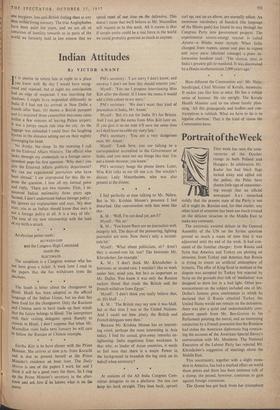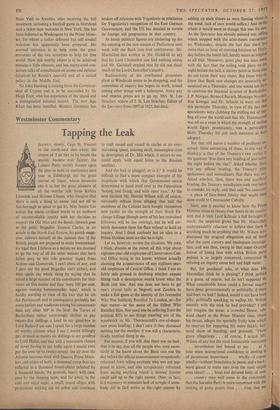Portrait of the Week
The anxiously awaited debate in the General Assembly of the UN on the Syrian question proved so much a waste of time that it was adjourned until the end of the week. It had con- sisted of the familiar charges: from Russia and Syria that America and Turkey are plotting an invasion; from Turkey and America that Russia is trying to create an artificial atmosphere of hysteria. The offer of King'Saud to mediate in the dispute was accepted by Turkey but rejected by Syria on the' grounds that talk of 'mediation' was designed to show her in a bad light. Other pro- nouncements on the subject included one of Mr. Dulles's famous press conferences in which he declared that if Russia attacked Turkey the United States would not remain on the defensive; there was also a quiet and understandably com- placent speech from Mr. Ben-Gurion to his Parliament pointing the moral, and an interesting conjecture by a French journalist that the Russians had stolen the American diplomatic bag contain- ing the account of the American Special Envoy's conversation with Mr. Menderes. The National Executive of the Labour Party has rejected Mr. Khrushchev's suggestion of meetings about the Middle East.
This uncertainty, together with a slight reces- sion in America, has had a marked effect on world share prices and there has been ominous talk of a slump; the pound, however, continues to gain against foreign currencies.
The Queen has got back from her triumphant State Visit to America after receiving the full treatment, including a football game in Maryland and a ticker-tape welcome in New York. She has been followed to Washington by the Prime Minis- ter, for whom a rather different but still cordial welcome has apparently been prepared. His avowed intention is to help unite the great resources of the two countries to help the free world. How this worthy object is to be achieved remains a little obscure, and less starry-eyed con- jecture talks of consultation on atoms and defence (inspired by Russia's sputnik) and of a united policy in the Middle East.
Sir John Harding is retiring from the Governor- ship of Cyprus and is to be succeeded by Sir Hugh Foot, who has experience of the island and a distinguished colonial record. The new Aga Khan has been installed. Western Germany has broken off relations with Yugoslavia in retaliation for Yugoslavia's recognition of the East German Government, and the US has decided to review its foreign aid programme to that country.
At home political figures are limbering up for the opening of the new session of Parliament next week with the Bank rate leak controversy. Mr. Macmillan has written to Mr. Gaitskell to say that his Lord Chancellor can find nothing amiss, and Mr. Gaitskell implied that he did not think much of the Lord Chancellor's inquiry.
Radioactivity at the overheated plutonium plant at Windscale seems to be dropping, and the committee of inquiry has begun its work, armed among other things with a helicopter. Army pay and cinema prices are to go up. Mrs. St. Loe Strachey, widow of J. St. Loe Strachey, Editor of the Spectator from 1897 to 1925, has died.



































 Previous page
Previous page